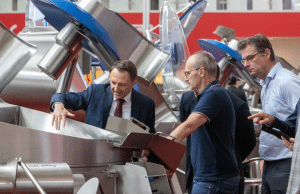Yesterday, 15 June 2020 R.I.F.E.L. (www.rifel-institut.de) published the results of an extensive survey on the economic effects of the meetings industry on behalf of the main professional associations of the German meetings industry.
Both the data on the annual turnover of the industry and the number of employees speak of the industry’s importance. The entire industry is labour-intensive and employs 1.5 million people. This ranks it second in terms of the number of employees. The reason lies in the complexity of the activity, which connects many professional profiles. What’s more, it creates 130 billion of revenue per year.
The German meetings industry ranks 6th among Germany’s key industries in terms of revenue. The first six areas are
Automotive industry 428,92 billion EUR
Mechanical engineering 261,78 billion EUR
Chemical and pharmaceutical industry 202,95 billion EUR
Electrical engineering industry 184,34 billion EUR
Food industry 179,56 billion EUR
Meetings industry 129,09 billion EUR
The entire pie of the German meetings industry is divided as follows:
88,55 % Business events (114,309 billion EUR)
5,91 % Public events (7,369 billion EUR)
5,13 % Cultural events (6,627 billion EUR)
0,41 % Sport events (0,524 billion EUR)
The events are clearly and logically structured into three main groups
Business events (fairs, congresses, conferences, seminars…)
Marketing events (brand promotion, product presentations)
Leisure events (sport, cultural, social and private events)
Germany is a world power in the field of event organization and according to the Events Industry Council from 2018, ranks 3rd (after the USA and China). It is therefore not surprising that more than 3 million conferences and congresses were held in Germany last year, in more than 7.500 venues.
This extremely important research brings many other interesting data that give an insight into the background of one of the most important German industries. It also includes a call to restart the industry after the coronavirus crisis and projections of what will happen if the state does not provide adequate assistance.
You can download the full research on the following link or see it in detail at www.rifel-institut.de.
